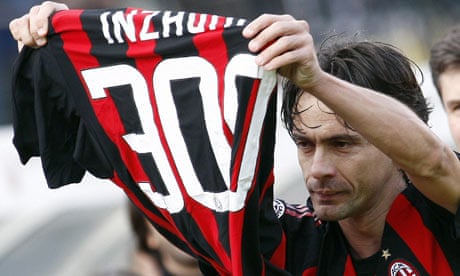One of my former colleagues once proposed Filippo Inzaghi, who scored his 300th career goal at the weekend, as a litmus test. If you don't rate him, he said, you don't know anything about football. As a sucker for Italian strikers since being captivated by Roberto Bettega in the 70s, I was always going to pass muster but many supporters get agitated by the mere suggestion that the Milan centre‑forward is a great player and it is not just Liverpool fans with bitter memories of the first goal of the 2007 Champions League final who refuse to put out the bunting.
Many other players down the years have proved to be the equivalent of footballing Marmite, loved and loathed in fairly equal measure. You only have to mention Emlyn Hughes's name and you can be sure of a testy response and Frank Lampard continues to get some people's goat. But while there is a consensus that the former Liverpool captain's reputation derives more from what he said than his accomplishments as a wonderful player, with Inzaghi it is more the very notion that he is world-class that tends to offend certain purists.
It was, after all, Johan Cruyff who said of him: "Look, actually he can't play football at all. He's just always in the right position." Perhaps the great Dutchman was joking but it has certainly given rise to the faint praise the Italian receives for his record, the sort of Bruce Forsyth "didn't he do well" acclamation that hints at the surprise reserved for a duffer's over-achievement. It was also said of Gerd Müller, remember, that "all he does is score goals" but no one decries the German's ability even though the penalty-area poacher supreme was at his most prolific in a time when the offside trap was rarely perfectly executed.
But even Inzaghi's area of expertise is not something that is widely appreciated. Sir Alex Ferguson had a pop at him, famously saying the striker "was born in an offside position", as if his ability to beat the defenders' trap somehow demeaned him. Sometimes, however, you have to be brave enough to be prepared to look like a fool if you are going to combat an expertly-marshalled defensive high line. Of course he is often caught out by it but such are the narrow margins in which he operates he has had to be football's Norman Stanley Fletcher, a perpetual offender who accepts getting caught as an occupational hazard. No one has worked the millimetres better and he takes falling foul of it 99 times in a game in his stride if he can escape the opposition's clutches just once.
There remains a distaste about his methods, however. Greedy and selfish are the two adjectives often thrown at the schoolyard goal-hanger and have been used to describe Inzaghi, despite that being part of his job description as a goalscorer. Michael Owen and Gary Lineker used to be described as "coming alive in the box" and their overall contribution to a team was largely measured in weight of goals but they never faced the same opprobrium. To some eyes he is seen as not being exactly dishonest so much as dishonourable, constantly lurking on the shoulder of a defender, parasitically looking for scraps. To me that is his genius, the ability to make something out of nothing, to do just what Jimmy Greaves did so often.
I accept that he will never fire the imagination in the manner of the captivating Italian No10s such as Gianni Rivera, Giancarlo Antognoni and Roberto Baggio but his clinical finishing is a comparable thing of beauty. The other thing I particularly like about him is that he celebrates each goal with the fervour of Marco Tardelli winning the World Cup in 1982. Because goals to him can be such hard work, after frequently trying and failing to beat the offside trap, they can never be mundane and it is little wonder that the enervated raised arm or pat on a team-mate's back do not do it for him. Instead he races to the touchline, often vaulting the advertising hoardings, pumping his fists and screaming like a happy banshee. The radiant smile, too, offers a glimpse of a child's joy in scoring. In the book of football cliches he is most likened to an assassin but if hit men brought attention to themselves like he does they would have pretty curtailed careers.
He is among the last of a breed with a long tradition in the game. When he and Ruud van Nistelrooy finally retire there will be no one left to take up the mantle as players become increasingly multifaceted and versatile. He will never be as celebrated as Romario but he deserves far more than to be remembered as a rich man's Kris Boyd. In the 70s the Leeds and England striker Allan Clarke titled his autobiography Goals are My Business. I can think of no more fitting epitaph for Inzaghi.

Comments (…)
Sign in or create your Guardian account to join the discussion